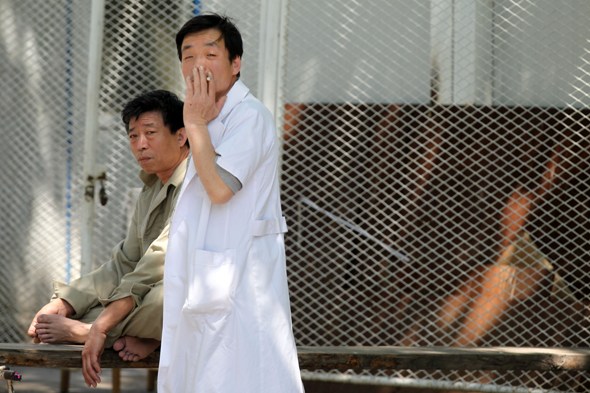Focus
City's healthy lead to butt out
By Yang Wanli (China Daily)
Updated: 2010-05-21 07:52
 |
Large Medium Small |
 A doctor at the China-Japan Friendship Hospital in Beijing smokes away. A survey by the Beijing health bureau shows about 16.7 percent of medical workers in the capital are smokers. Wang Jing / China Daily |
Doctors among the prime target for the latest anti-smoking campaign, which will concentrate on hospitals, Yang Wanli discovers.
Beijing's plan to lead the nation's anti-smoking efforts by banning cigarettes from hospitals by the end of this year will face huge challenges, said a senior campaigner after learning as many as one in three doctors was a smoker.
"The promotion is not easy, because there are lots of people, both patients and doctors, who are smokers and whose smoking is part of their lives," said Qi Changsuo, secretary-general of the smoking and health association branch of the Beijing health promotion committee.
"Even if doctors can quit smoking, the cleaners and security staff working in the hospitals, who are not as aware of the downside, will take more time to quit."
She was speaking after a survey, conducted by the Beijing health bureau, showed one in three male doctors in the city were smokers.
"However, we have to try our best to help the smokers," said Qi. "After all, smoking brings nothing to us but disease."
China ratified the World Health Organization Framework Convention on Tobacco Control (FCTC) in 2005 and joined global anti-smoking efforts.
All member countries of the FCTC are obliged to introduce a comprehensive ban on tobacco consumption in public places by next year.
Beijing has announced that smoking will not be allowed within Ministry of Health buildings from May 31. The move is believed to be part of a nationwide initiative to ban smoking indoors at health institutions by the end of 2011.
The survey conducted by the Beijing health bureau quizzed more than 6,000 doctors and medical staff from 76 medical departments and hospitals in the capital earlier this year.
It shows that about 16.7 percent of medical workers were smokers.
Of those who smoke, 86.8 percent said they did so in the workplace.

"To give up smoking is to be isolated from society," said a doctor who has been smoking for 40 years.
"Most of my male friends are smokers. Smoking can make people feel closer in China and it has become a way of social communication between Chinese men.
"Maybe, a non-smoking culture could be nurtured among doctors but we will still need to communicate with others who are not involved in medical work."
Across the capital, 219 hospitals and more than 1,000 restaurants had joined the anti-smoking campaign by the end of last year. But at entertainment venues, widespread support for anti-smoking regulations is lacking.
"More than half of our customers are smokers," said a staff member at a billiards club in Haidian district.
"Stopping smoking would kill our business." However, some doctors said smokers can be persuaded to quit if they are told about the negative side of their habit.
"Medical research shows that smokers are 20 to 40 times more likely to get lung cancer," said Zhi Xiuyi, general director of the Cancer Center at Beijing Capital Medical University.
"We have to pay more attention to cancer since it has already became the top killer disease in Beijing."
According to statistics released by the Ministry of Health, there are 350 million smokers in China and more than one million people die from diseases related to smoking each year.
It is estimated that as many as 100 million people who smoke today will die from smoking-related illnesses by the end of 2050.
"If doctors can quit smoking, it will help the country's anti-smoking campaign move forward, maybe just a small step," Zhi said.
After smoking bans are introduced nationwide at health departments and hospitals, the program will likely be rolled out to other institutions as part of the country's efforts to meet its FCTC obligations by 2011.
"I think the promotion is not just about stopping smoking in medical places but also is a way to spread the concept of healthy living," said Xiao Dan, a doctor at Chaoyang Hospital.
"After all, people can still smoke outside the hospital, which means they may not change their habit and may continue harming themselves."
The hospital built an anti-smoking clinic early in 1996 to try to help people wanting to kick the habit but the total number of visitors was not even 3,000 by the end of last year.
Most of the disappointingly low number of people who attended the clinic were only there because they were suffering from diseases caused by their smoking.
"Doctors need to urge smokers to take more precautious," Xiao said.
| ||||
On May 1 last year, the Beijing municipal government released a regulation limiting smoking in public places. Between May and June last year, 14,865 public places - including bars and hotels - were inspected and 29,652 people were told to stop smoking in public.
The Beijing health bureau is also planning to provide a smoking treatment system at all the city's hospitals. Under the program, smokers will be identified and receive doctors' advice on quitting.
In addition, the Beijing Capital Medical University started a class this week to train 50 anti-smoking press officials who will work in all districts and counties.
Cui Xiaobo, a doctor at the university, said good publicity is essential in the fight against smoking because it will clear up misunderstandings about rules and initiatives.
